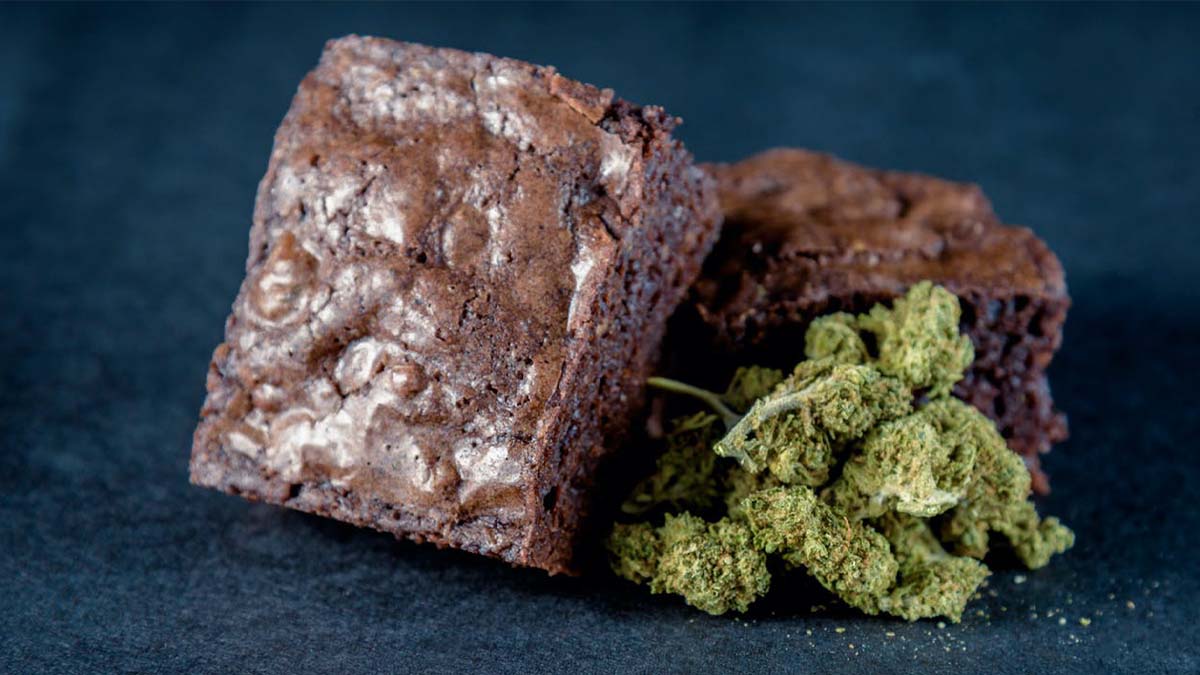

If a craving for fudge brownies or gummy snakes has ever blindsided you, you’ve likely experienced the power of hormones. In addition to driving desires for certain foods, the body’s many hormones also help fire up the libido, regulate mood, sleep, and even body temperature.
Many know first-hand how cannabis exerts subtle—or not-so-subtle—effects over our mood, sleep, and appetite, so it’s clear the plant interacts with our hormones in some way. But how?
The endocannabinoid and endocrine systems
Hormones are helpful chemical messengers secreted by the endocrine system, a network of glands and organs that release hormones into the body. The major endocrine glands include the hypothalamus, pituitary, pancreas, pineal, thyroid, parathyroid, adrenal, ovaries, and testes.
“There are approximately 50 different hormones in the body,” said Dr. Patricia Frye, MD, a board director for the Society of Cannabis Clinicians. “Some hormones are released to stimulate glands to release hormones, and other hormones act on target organs to modulate a number of metabolic functions.”
The endocannabinoid system is another vital regulatory force in the body. Sleep, mood, metabolism, appetite, bone growth, fertility—the endocannabinoid system features in all these processes. Scientists believe the main function of the endocannabinoid system is to bring these functions into homeostasis, or balance.
“Overall, cannabis interacts with the endocannabinoid system, a neuro-modulating system that maintains balance or homeostasis in the body,” said Frye. “Given that, it would stand to reason that the system oversees almost every neurotransmitter and hormonal system. We have studied some of the mechanisms of this oversight, particularly in preclinical, animal studies, but there is still a lot that we don’t fully understand as to how these findings translate into humans.”
There is evidence, however, that the endocannabinoid system is involved in appetite, sexual function, and stress.
Cannabis, hunger hormones, and metabolism
Most of us are familiar with the heavy-duty pizza cravings that can accompany a joint. Cannabis is already known to elevate appetite and intensify pleasure we experience when eating.
Ghrelin
In a 2020 study published in Nature, researchers discovered that ghrelin hormone levels were higher after consuming cannabis orally rather than smoking or vaporizing cannabis. Ghrelin is affectionately known as the “hunger hormone” because it ignites appetite and adjusts food intake.
Growing evidence also suggests there is a collaborative interaction between the endocannabinoid system and ghrelin. Both drive feeding, and experts believe the two work synergistically to encourage hunger and eating. Endocannabinoid and ghrelin receptors are also similarly distributed in areas of the brain associated with feeding, and in organs involved in metabolism.
Leptin
Cannabis also influences the body’s leptin hormone levels. “Leptin is secreted by the fat cells and sends signals to the hypothalamus regulating food intake and energy expenditure, helping one maintain their normal body weight or set point,” said Frye.
Research has shown that cannabis smokers have lower leptin levels than non-smokers. This finding could explain why cannabis smokers tend to have lower body fat percentages and obesity rates.
“The more body fat you have, the more leptin circulating to maintain that fat mass by increasing appetite and decreasing metabolic rate,” said Frye. “Cannabis users also tend to have lower BMIs and waist circumferences than non-users.”
Insulin and glucose
Cannabis also appears to influence insulin concentrations, the hormone responsible for regulating glucose through the body. When the right concentration of insulin is circulating in the blood, glucose is transported into cells to become fuel to maintain energy levels.
In the case of diabetics, for example, insufficient insulin levels means glucose is not directed into the body’s cells but stays circulating in the blood, causing hyperglycemia.
In a 2020 study, participants given a placebo brownie experienced a spike in blood-insulin concentrations. That’s fairly predictable—many of us know the rush, then the unavoidable freefall, that comes with a sugar hit.
However, when participants were given a brownie infused with THC, the insulin spike was blunted. Regardless of whether cannabis was consumed orally, smoked or vaporized, insulin levels remained considerably lower than the controls.
Frye also points out that CBD has been linked to improved glucose metabolism. “Human trials are lacking but in my clinical experience, it is not uncommon to see patients with Type 2 diabetes whose glucose-lowering medication doses come down after starting CBD. This might be a function of CBD’s anti-inflammatory or stress-relieving effects, or a direct effect on glucose metabolism and/or insulin sensitivity,” she said.
Let’s talk about sex, baby… and cannabis
What about the influence of cannabis on other appetites? Hormones are a critical factor in sex drive and fertility. Regular cannabis consumers often debate whether weed boosts or stifles sex drive.
Cannabinoid receptors have been found in both male and female hormones and in the endocrine glands involved in reproduction and fertility, including the hypothalamus, pituitary gland, ovaries, and testes.
“Cannabis stimulates the release of oxytocin, which is also called the ‘hugging hormone.’ It is responsible for reproductive functions like uterine contractions during labor and breastfeeding,” explained Frye. “Oxytocin is also responsible for the satisfaction people experience from social interaction, and promotes emotional bonding.”
Frye points out there’s conflicting evidence about the effects of cannabis on male fertility. “A 2015 study in humans showed a 29% decrease in sperm count, as have numerous preclinical studies,” she said. “However, a 2019 study of men evaluated for infertility found that men who self-reported smoking cannabis regularly had a higher sperm count than men who had never smoked cannabis.”
Short-term cannabis use may boost libido, but chronic use may also cause erectile dysfunction. “While low to moderate doses of THC can promote bonding, heighten arousal, and stimulate an erection, too much THC can cause anxiety or impede ejaculation which may negatively impact the sexual encounter,” said Frye.
When it comes to ladies, the findings are similar. According to one 2019 review, cannabis can reduce female fertility by disrupting the gonadotropin-releasing hormone, leading to reduced estrogen and progesterone production. Female cannabis consumers may also experience a dose-dependent impairment in ovarian function and a decrease in the critical reproductive hormone estradiol.
“I do not recommend cannabis use for women actively trying to conceive and/or sustain a pregnancy, except when the benefit of cannabis therapy far outweighs the risk of impaired fertility,” advised Frye.
On the other hand, cannabis appears to boost the female sex drive. In a study of women who reported using marijuana before sex, 68.5% divulged that their overall sexual experience was more pleasurable, 60.6% reported an increase in sex drive, and 52.8% shared that they had experienced an increase in satisfying orgasms.
Stop stressing: weed and cortisol levels
Cortisol is the body’s primary stress hormone. Once cortisol kicks in, non-essential bodily functions are curbed so the body can enter fight or flight mode. While THC in cannabis typically elevates cortisol levels, individual experiences of effects will vary based on frequency of use.
For occasional consumers, an increase in cortisol can increase blood pressure and provoke anxiety. Long-term consumers can become habituated to this regular cortisol spike, dulling a response to acute stress.
Cortisol isn’t just responsible for stimulating stress, however. A morning dose of cortisol is also critical for getting out of bed in the morning—cortisol peaks in the morning and slowly declines throughout the day. This morning spike is blunted in chronic cannabis consumers, rendering it more challenging to shake off sleepiness and dive into the day.
Less is more
“The best advice I can give is to use the least amount of cannabis needed to achieve the desired effects,” said Frye. “Excesses in the levels of circulating cannabinoids has the potential to lead to undesirable consequences.”
That said, Frye also acknowledged that cannabis has been recognized to improve diverse symptoms associated with endocannabinoid imbalance, resulting in enhanced health and well-being. “These benefits may also be a function of hormonal adjustments that would ordinarily be modulated by adequate levels of circulating endocannabinoids,” she said.
Emma Stone Via Leafly (https://www.leafly.com/news/health/how-cannabis-affects-hormones-appetite-stress-fertility)
Keep out of reach of children. For use only by adults 21 years of age or older.
a:0:{}